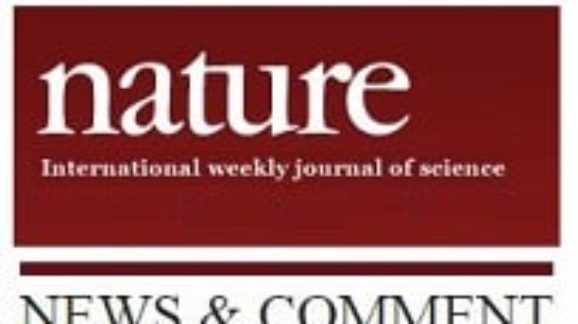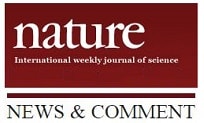Dog Bites Man: Nature Magazine Endorses Hillary

 “Hillary Clinton will make a fine U.S. president.” So declares the title of a recent lead editorial in Nature magazine. “She has shown tremendous understanding of complex issues directly relevant to Nature’s readers, and has engaged with scientists and academics,” the editorial explains. Which issues? Women’s rights, health care, and, of course, climate change.
“Hillary Clinton will make a fine U.S. president.” So declares the title of a recent lead editorial in Nature magazine. “She has shown tremendous understanding of complex issues directly relevant to Nature’s readers, and has engaged with scientists and academics,” the editorial explains. Which issues? Women’s rights, health care, and, of course, climate change.
There was a time when science journals would have been embarrassed to engage in electioneering. Aside from being in questionable taste, overt politicking could undermine public trust in scientists as honest brokers of policy-relevant information.
Alas, ever since the 1960s, activist-scientists have asserted the right to have their cake and eat it, demanding deference to their views as apolitical experts and then exploiting the appearance of impartiality to promote “progressive” causes that just happen to increase their influence, prestige, and, frequently, incomes. The so-called climate skeptic movement is in no small part a natural reaction to the rhetorical legerdemain of activist-scientists who issue “consensus” reports to “settle” matters of public controversy and then inflate consensus into a claim to rule.
The implicit logic of Nature’s editorial might be put as follows: Vote for our candidate, because we speak for science! Yet they don’t even get basic facts straight.
The editorial begins by referencing a previous editorial, titled “Into Ignorance”:
In March 2011, this publication suggested that the U.S. Congress seemed lost in the “intellectual wilderness.” The Republicans had taken over the House of Representatives, and one of the early acts of the chamber’s science committee was to approve legislation that denied the threat of climate change.
Actually, the legislation in question was approved by the House Energy & Commerce Committee, not the Science Committee. More importantly, the legislation took no position on “the threat of climate change.”
“Into Ignorance” warned that a committee of the House “was poised to pass legislation that would overturn a scientific finding on the dangers of global warming.” The legislation was H.R. 910, the Energy Tax Prevention Act of 2011.
House Republicans would certainly be benighted if they sought to “overturn a scientific finding” by passing a law. That would be an error akin to believing experts can “settle” scientific controversies by counting heads and issuing consensus statements.
But H.R. 910’s objective was not to repeal the Environmental Protection Agency’s endangerment finding—the agency’s analysis. Rather, the objective was to cancel the “legal effect” of the rule in which EPA published the analysis. That is evident to anyone who bothers to read the 528-word bill.
“Into Ignorance” deployed the same deceptive rhetoric used by EPA and its allies to scuttle a similar measure in 2010—S.J.Res.26, a resolution introduced by Sen. Lisa Murkowski (R-Alaska). The half-page resolution said nothing whatsoever about climate science. Its sole function was to overturn the “legal force and effect” of EPA’s endangerment rule. Yet Sen. Barbara Boxer (D-Calif.) likened it to an attempt by Congress to repeal the famous 1964 Surgeon General’s report linking cigarette smoking to cancer.
Rubbish. As I explained at the time:
Contrary to Sen. Barbara Boxer and other critics, the resolution is not a referendum on EPA's science. Rather, it is a referendum on the constitutional propriety of unelected bureaucrats, courts, and eco-litigation groups setting climate and energy policy for the nation. The resolution is not an attempt to veto the scientific content of EPA’s endangerment finding. Rather, it would veto the finding’s legal force and effect.
Thus, there is no valid analogy, as Sen. Boxer claims, between the Murkowski resolution and Congress vetoing the Surgeon General’s finding that cigarette smoking causes cancer. The Surgeon General’s finding was simply that—an assessment of the scientific literature. It did not even presume to offer policy recommendations, much less trigger a host of new regulations Congress never approved, as EPA’s endangerment rule will do, if it is allowed to stand.
Like Boxer, “Into Ignorance” misconstrued H.R. 910 in order to attack Republicans in the name of science. That’s the sort of political misuse of science that makes ordinary folks skeptical. Especially when the same experts invoke a consensus based largely on errant climate models to justify putting an energy-starved world on an energy diet.
“Into Ignorance” called H.R. 910 “fundamentally anti-science,” yet supplied not even a scrap of textual evidence. Only one part of the bill, Section 4, touched on scientific matters. Here it is in full:
SEC. 4. SENSE OF CONGRESS
It is the sense of the Congress that—
(1) there is established scientific concern over warming of the climate system based upon evidence from observations of increases in global average air and ocean temperatures, widespread melting of snow and ice, and rising global average sea level;
(2) addressing climate change is an international issue, involving complex scientific and economic considerations;
(3) the United States has a role to play in resolving global climate change matters on an international basis; and
(4) Congress should fulfill that role by developing policies that do not adversely affect the American economy, energy supplies, and employment.
There is nothing anti-scientific, or even unscientific, in the foregoing. In fact, nothing in it is inconsistent with the so-called consensus.
The pretense of acting on behalf of an apolitical moral authority has been an immense political asset from time immemorial. In antiquity, rulers invoked the will of the gods. In Medieval times, they cited Holy Writ. Today, they pledge fealty to the “Consensus of Scientists.” However, the pretense works, evoking respect rather than mockery, only if the elite in question is politic about its political ambitions. The Climategate emails were damaging because they exposed top climate scientists as political schemers. Nature’s editors have outed themselves. Thanks, guys, you could not have rendered a more valuable public service.